Sources
Banfield, Stephen (2001). "Lutz, Meyer". In Sadie, Stanley; Tyrrell, John (eds.). The New Grove Dictionary of Music and Musicians (2nd ed.). London: Macmillan Publishers. ISBN 978-1-56159-239-5.
Faust and Marguerite is a romantic opera in three acts, dating from 1855, based on the Faust legend. The score was composed by Meyer Lutz. The libretto was written by Henri Drayton based on the Johann Wolfgang von Goethe play Faust . The 1900 film Faust and Marguerite is an adaptation of the play. It was directed by Edwin S. Porter, three years before he directed The Great Train Robbery .
Banfield, Stephen (2001). "Lutz, Meyer". In Sadie, Stanley; Tyrrell, John (eds.). The New Grove Dictionary of Music and Musicians (2nd ed.). London: Macmillan Publishers. ISBN 978-1-56159-239-5.

Faust is the protagonist of a classic German legend based on the historical Johann Georg Faust.
The year 1904 in film involved some significant events.
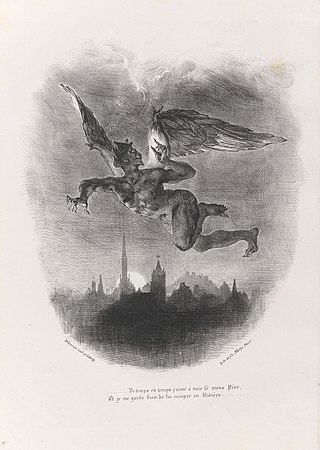
Mephistopheles, also known as Mephisto, is a demon featured in German folklore. He originally appeared in literature as the demon in the Faust legend and has since become a stock character appearing in other works of arts and popular culture.

La damnation de Faust, Op. 24 is a work for four solo voices, full seven-part chorus, large children's chorus and orchestra by the French composer Hector Berlioz. He called it a "légende dramatique". It was first performed at the Opéra-Comique in Paris on 6 December 1846.

Faust is an opera in five acts by Charles Gounod to a French libretto by Jules Barbier and Michel Carré from Carré's play Faust et Marguerite, in turn loosely based on Johann Wolfgang von Goethe's Faust, Part One. It debuted at the Théâtre Lyrique on the Boulevard du Temple in Paris on 19 March 1859, with influential sets designed by Charles-Antoine Cambon and Joseph Thierry, Jean Émile Daran, Édouard Desplechin, and Philippe Chaperon.

Cinder Ellen up too Late is a musical burlesque written by Frederick Hobson Leslie and W. T. Vincent, with music arranged by Meyer Lutz from compositions by Lionel Monckton, Sidney Jones, Walter Slaughter, Osmond Carr, Scott Gatti, Jacobi, Robertson, and Leopold Wenzel. Additional lyrics were written by Basil Hood. The show was a burlesque of the well-known pantomime and fairy tale, Cinderella.
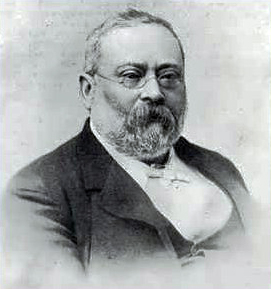
Wilhelm Meyer Lutz was a German-born British composer and conductor who is best known for light music, musical theatre and burlesques of well-known works.
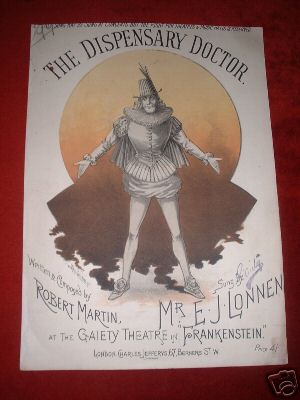
Frankenstein, or The Vampire's Victim is a musical burlesque in three acts written by Richard Henry. The music was composed by Meyer Lutz. The piece is a burlesque loosely based on the 1818 Mary Shelley novel Frankenstein; or, The Modern Prometheus and the Adelphi Theatre drama based on the novel.
Faust has inspired artistic and cultural works for over four centuries. The following lists cover various media to include items of historic interest, enduring works of high art, and recent representations in popular culture. The entries represent works that a reader has a reasonable chance of encountering rather than a complete catalog.

Faust up to Date is a musical burlesque with a libretto was written by G. R. Sims and Henry Pettitt, and a score written by Meyer Lutz. Set in Nuremberg, it is a spoof of Gounod's opera, Faust, which had first been performed in London in 1864. The burlesque followed on from an earlier Lutz musical, Mephistopheles, or Faust and Marguerite.

Ellen "Nellie" Farren was an English actress and singer best known for her roles as the "principal boy" in musical burlesques at the Gaiety Theatre in London.

Marguerite de la nuit is a 1955 French language motion picture fantasy drama directed by Claude Autant-Lara, and written by Ghislaine Autant-Lara and Gabriel Arout (adaptation), based on novel by Pierre Dumarchais. The film stars Michèle Morgan and Yves Montand.
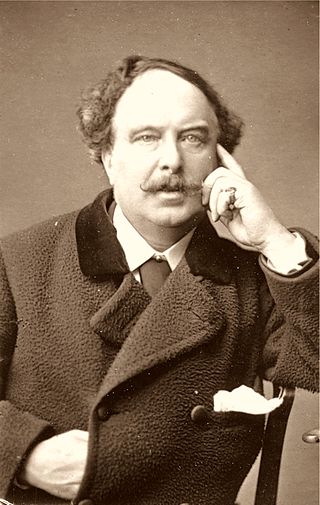
George Perren was an English tenor active in both concert and opera. He was born in Camberwell, a district of London. After concert appearances in the provinces he studied in Milan with Lamperti and on his return to England made his debut in The Surrey Theatre on 28 May 1855 in Faust and Marguerite by Meyer Lutz. For several years he sang in the Italian Opera Company at Her Majesty's Theatre. He sang in the premiere of Edward Loder's Raymond and Agnes at the Theatre Royal, Manchester and in the premiere of George Alexander McFarren's opera She Stoops to Conquer at the Drury Lane Theatre. Perren was also popular as a ballad singer and composed several works in that genre. He retired from the stage in the 1880s and died in Hove, Sussex on 7 April 1909.
Faust and Marguerite may refer to:

Faust and Marguerite is a 1900 American silent film produced and distributed by Edison Manufacturing Company. It was directed by Edwin S. Porter and based on the Michel Carré play Faust et Marguerite and the 1859 opera Faust adapted from the play by Charles Gounod.
Damnation du docteur Faust, released in the United States as Faust and Marguerite and in the United Kingdom as Faust, is a 1904 French silent film directed by Georges Méliès.

Faust aux enfers, released in the United States as The Damnation of Faust and in Britain as The Condemnation of Faust, is a 1903 French short silent film directed by Georges Méliès.
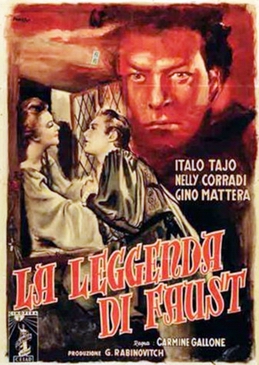
The Legend of Faust is a 1949 Italian drama film directed by Carmine Gallone and starring Italo Tajo, Nelly Corradi and Gino Mattera.

Le petit Faust is an opéra bouffe in four acts which burlesques the drama Faust by Goethe and the opera of the same name by Gounod. The music of the piece is by Hervé, with a text by Hector-Jonathan Crémieux and Adolphe Jaime. The work had its premiere in Paris at the Théâtre des Folies-Dramatiques on 23 April 1869.
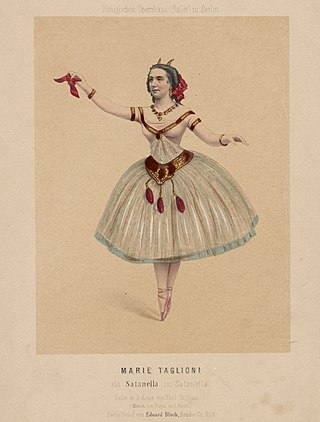
Faust ballets are a set of ballets, choreographed between the 18th and 20th centuries, based on the legend of Faust. As early as 1723, London-based John Rich put on a Faust-inspired ballet pantomime called The Necromancer at the Lincoln's Inn Fields Theatre. In the 19th century several productions took Faust as their subject matter including August Bournonville's 1832 production Faust for the Royal Danish Ballet.